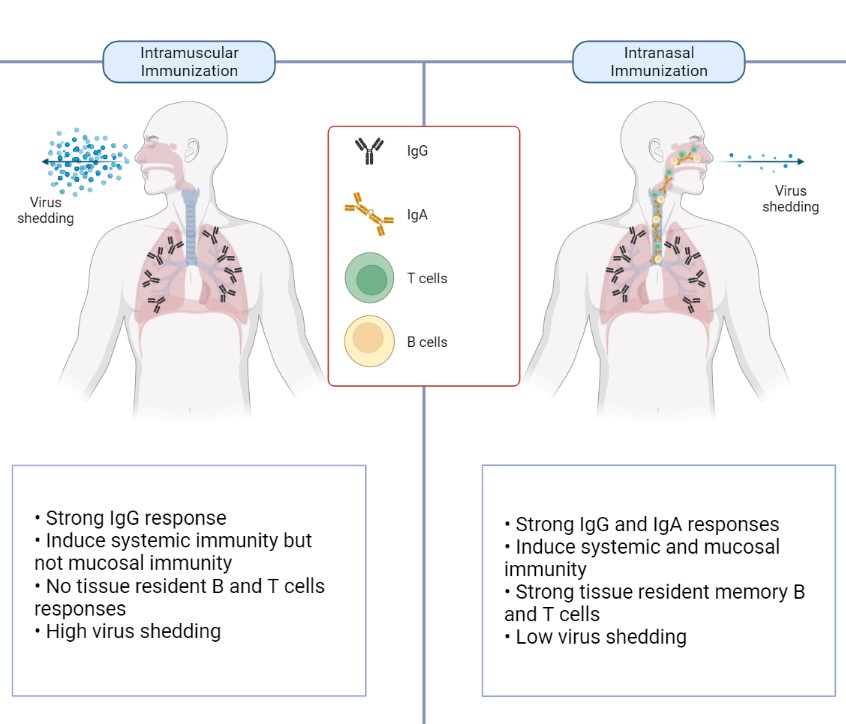The next generation of COVID-19 vaccines could soon be here – and they’re totally needle-free. New research is showing the potential of an intranasal vaccine that’s been in development for four years, and it’s not just good news for the needle-phobes out there.
“This is a live attenuated intranasal vaccine, called CDO-7N-1, designed to be administered intranasally, thereby inducing potential mucosal immunity as well as systemic immunity with just a single dose,” said Professor Suresh Mahalingam from Griffith University, in a statement.
“The vaccine induces strong memory responses in the nasal mucosa offering long-term protection for up to a year or more.”
In other words, this approach builds an immune response right where the virus usually gets into the body: inside the nose.
Other groups of scientists have been exploring the idea of an intranasal COVID-19 vaccine. In fact, there’s one that’s already been approved for use as a booster in India. That one is a viral vector vaccine – the gene that codes for the SARS-CoV-2 spike protein is carried inside a “shell” created from an adenovirus particle, which itself cannot replicate or cause any disease. It’s a way to introduce the body’s immune system to an important SARS-CoV-2 gene so that it can mount a response for the next time you encounter the virus for real.
This latest intranasal vaccine, CDO-7N-1, works slightly differently. As a live-attenuated vaccine, it contains the complete SARS-CoV-2 virus, which has been weakened enough that you won’t actually get full-blown COVID when you take the vaccine.
There are lots of live vaccines already in use, with the MMR being a famous example. They’re not suitable for everyone – people with compromised immune systems are sometimes unable to have them – but they do have a number of advantages over other types.
“Unlike the mRNA vaccine which targets only the spike protein, CDO-7N-1 induces immunity to all major SARS-CoV-2 proteins and is highly effective against all major variants to date,” explained lead author Dr Xiang Liu.
Live vaccines also typically induce longer-lasting immunity with fewer doses than other methods. CDO-7N-1 has another key point in its favor, according to Liu: “Importantly, the vaccine remains stable at 4°C [39.2°F] for seven months, making it ideal for low- and middle-income countries.”

This comparison shows why delivering a live vaccine through the nose can be so advantageous vs. a traditional injection.
Image credit: Griffith University
The team’s recent paper details how they developed the vaccine as well as several rounds of preclinical testing in mice, Golden Syrian hamsters, and Mauritian cynomolgus macaques. The results showed that the attenuated virus didn’t cause any lung damage, but that the vaccine induced “robust” immunity with just one dose.
The animals appeared to develop strong antibody responses against multiple variants of the virus that causes COVID-19, as well as the related SARS-CoV-1, which caused the SARS outbreak back in 2002-2004.
“We have completed all the necessary studies of this novel COVID-19 vaccine which offers tremendous advantages over other vaccines. We now look forward to taking the vaccine candidate to clinical trials,” said Dr K. Anand Kumar, co-author and managing director of Indian Immunologicals, Ltd., the pharmaceutical company that the vaccine has been licensed to.
If the clinical trial results are just as promising, it could lead to a needle-free option for many people seeking a COVID booster in the future.
The current COVID-19 vaccines offer excellent protection, and the authors stress that “vaccination is the primary and most effective way to prevent life-threatening COVID-19 disease.” However, we know that the protection they offer doesn’t last forever, and that they need regular updates to cope with the new variants this virus is throwing at us. A live intranasal vaccine, for those able to take it, could be a great option for helping to address some of these issues.
The study is published in the journal Nature Communications.
Source Link: Intranasal COVID-19 Vaccine Gives Broad, Lasting Immunity Without A Needle In Sight